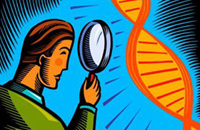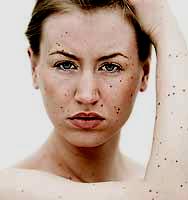Hereditary diseases arise as a result of a defect in the cell software apparatus, which leads to the emergence of mutations of hereditary information. Treatment of hereditary diseases symptomatic. The new treatment method is gene therapy.
Content
 Hereditary diseases - diseases, the emergence and development of which are associated with defects in the cell software apparatus transmitted by inheritance through the grounds (egg and spermatozoa).
Hereditary diseases - diseases, the emergence and development of which are associated with defects in the cell software apparatus transmitted by inheritance through the grounds (egg and spermatozoa).
The basis of hereditary diseases is the violations (mutations) of hereditary information - chromosomal, gene and mitochondrial. Hence the classification of hereditary diseases:
Among the hereditary diseases developing as a result of mutations, three subgroups traditionally distinguish:
- Monogenic hereditary diseases
- Polygenic hereditary diseases
- Chromosomal aberrations
Diseases should be distinguished from hereditary diseases that are due to intrauterine damage caused by, for example, infection (syphilis or toxoplasmosis) or exposure to other damaging factors on the fetus during pregnancy.
Many genetically determined diseases manifest immediately after birth, but after some, sometimes very long, time.
Monogenic hereditary diseases
Monogenic diseases are inherited in accordance with the laws of the classical genetics of Mendel. Accordingly, for them, a genealogical study allows you to identify one of the three types of inheritance: autosomal dominant, autosomal and recessive and adhesive inheritance.
This is the most wide group of hereditary diseases. Currently, more than 4,000 variants of monogenic hereditary diseases are described, the overwhelming majority of which is quite rare (for example, the frequency of sickle cell anemia - 1/6000).
A wide range of monogenic diseases forms hereditary metabolic disorders, the emergence of which is associated with the mutation of genes, which controls the synthesis of enzymes and determine their deficit or defects of the structure - enzymesopathy.
Polygenic hereditary diseases
Polygenic diseases are inherited difficult. For them, the question of inheritance cannot be solved on the basis of Mendel's laws. Previously, such hereditary diseases were characterized as diseases with hereditary predisposition. These diseases include diseases such as cancer, diabetes, schizophrenia, epilepsy, ischemic heart disease, hypertension and many others.
Chromosomal aberrations
Chromosomal diseases are due to a gross violation of the hereditary apparatus - a change in the number and structure of chromosomes. A typical reason, in particular, is alcohol intoxication of parents when conceived («Drunk children»). This includes Down syndromes, Clainfelter, Sherchevsky - Turner, Edwards, «Feline Cry» and others.
Diagnosis and treatment of hereditary diseases
Recently, it seems that the relatively high frequency of hereditary diseases is due to certain advantages «Mutants» in relation to the factors of natural selection or with «predisposition to the disease».
Therapy of hereditary diseases is included in symptomatic treatment and gene therapy.
Symptomatic treatment
Hereditary diseases are characterized by various symptomatic manifestations, and their treatment is largely symptomatic. Separate metabolic disorders are corrected by the appointment of special diets aimed at reducing toxic substances in the body, the accumulation of which is due to mutations in certain genes. For example, with phenylketonurias prescribe a disabled diet.
To attenuate the symptoms of hereditary diseases associated with a defect defect in a certain protein, administered intravenously such a functional form that does not cause an immune response. Such replacement therapy is used in the treatment of hemophilia, severe combined immunodeficiency, etc. Sometimes for compensation for certain lost functions, bone marrow transplantation and other organs are carried out. The existing therapy, unfortunately, in the overwhelming majority of cases is little effective.
Gene therapy
A fundamentally new method, effective and aimed at the destruction of the genetic cause of a hereditary disease, is gene therapy. The essence of the generate method is the introduction of normal genes in defective cells.
The concept of gene therapy consists in the fact that the most radical way of combating various types of diseases caused by changes in the genetic content of cells should be the processing directed directly to the correction or destruction of the genetic cause of the disease, and not its consequences.
Due to the fact that gene therapy is a new direction of medical genetics, and diseases that are trying to treat this method are very diverse, many original approaches to this problem have been created. Currently, genotherapy research is mainly aimed at the correction of genetic defects somatic, rather than sex cells, which is associated with purely technical problems, as well as safety reasons.









